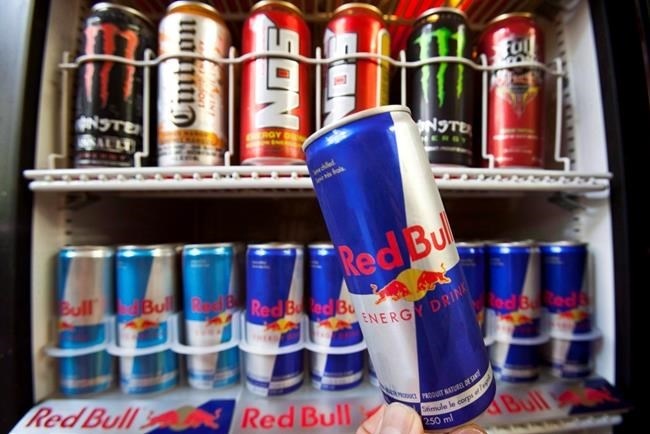
Energy drinks are shown in a store on Monday July 26, 2010 in Montreal. The sudden death of a 16-year-old South Carolina boy from a probable caffeine-induced heart arrhythmia has renewed concerns about the risks of children and youth consuming energy drinks and other beverages containing high levels of the stimulant.
Image Credit: THE CANADIAN PRESS/Paul Chiasson
May 18, 2017 - 6:00 AM
TORONTO - The death of a 16-year-old South Carolina boy from a probable caffeine-induced heart arrhythmia has renewed concerns about the risks of young people consuming energy drinks and other beverages containing high levels of the stimulant.
Davis Cripe died April 26 after drinking a large Mountain Dew, a latte from McDonald's and an energy drink over a two-hour period before collapsing in his classroom.
The Chapin, S.C., high school student was a healthy teenager with no pre-existing heart condition, local coroner Gary Watts said Monday in releasing the cause of death.
Consuming excessive caffeine can speed up the heart rate and in some cases lead to an arrhythmia, a condition in which the electrical impulses that co-ordinate the heartbeat go awry, causing the heart to beat too fast, too slow or in an irregular pattern.
"If you look at what the young man drank ... it's a fair bit of caffeine over a fairly short period of time," Dr. Michael Reider, head of pediatrics at Western University, said Wednesday from London, Ont.
Reider said many energy drinks, such as Red Bull, Monster and Rockstar, contain high levels of caffeine, as do Mountain Dew in the U.S. and lattes, which are made from coffee.
Some energy drinks contain more than 200 milligrams of the stimulant, he said. "So it's entirely possible ... this young man may have taken in 400 milligrams in the space of two hours.
"That would definitely quickly kick your heart rate up, and if you have some (underlying) cardiac arrhythmia, it just might fall into a pattern where it speeds up just enough to have a fatal arrhythmia."
The American Academy of Pediatrics is unequivocal in its position on the caffeine-rich beverages: "Energy drinks pose potential health risks because of the stimulants they contain and should never be consumed by children or adolescents."
Reider, chair of the Canadian Paediatric Society's drug therapy and hazardous substances committee, said the CPS has not developed a position statement on whether energy drinks are appropriate for children or teens.
"I think that this is not something we have actually thought a lot about," he said. "I think that a lot of pediatricians are a bit unaware of how much caffeine there is in the average drink and how popular they are with adolescents."
However, he believes most doctors would advise patients of any age to limit their consumption of caffeine, which in high amounts can lead to restlessness, anxiety, depression, tremors and difficulty sleeping.
"The basic Health Canada position is that for an adult, you shouldn't take in more than 400 milligrams a day, but the standard for kids is not so well-defined."
Health Canada says most adults can safely consume two servings of a typical caffeinated energy drink per day with no health consequences, but recommends that children and women of child-bearing age limit their consumption, spokesman Henry Guardado said by email.
The federal department recommends the following limits for children: age four to six, 45 mg/day; seven to nine, 62.5 mg/day; and 10 to 12, 85 mg/day. Women who are pregnant, planning to become pregnant or breastfeeding should restrict intake to 300 mg/day.
On its website, Health Canada says it has not developed definitive advice for adolescents 13 and older because of insufficient data. However, it suggests daily caffeine intake for this age group should not exceed 2.5 mg/kg body weight.
"This is because the maximum adult caffeine dose may not be appropriate for light-weight adolescents or for younger adolescents who are still growing. The daily dose of 2.5 mg/kg body weight would not cause adverse health effects in the majority of adolescent caffeine consumers ... older and heavier-weight adolescents may be able to consume adult doses of caffeine without suffering adverse effects."
Caffeinated energy drinks sold in Canada contain between 200 mg/litre and 400 mg/litre of the stimulant. "However, for a single-serving container — up to 750 millilitres — the maximum amount of caffeine cannot exceed 180 mg per container," said Guardado.
Carolyn Fell, a spokeswoman for the Canadian Beverage Association, said energy drinks sold in Canada carry labels advising that the products are not recommended for children.
Regulations governing energy drinks in Canada differ from those in the U.S. and those sold in Canada have "roughly half the caffeine of an equivalent-sized cup of coffee-house drip coffee," she said by email.
The trade organizations's website says a 250-ml single-serving energy drink contains 80-100 mg of caffeine, while a larger 473-ml can is limited to 180 mg of caffeine.
Reider said the CPS committee he chairs is planning a teleconference next week on the issue, which could result in a future position statement or practice point for pediatricians as to what advice they should give adolescent patients about consuming energy drinks.
Meanwhile, he said parents should speak to their teenagers about the potential risk of energy drinks — and especially the dangers of combining them with alcohol.
"I think it means parents just need to have a conversation about responsible drinking of the energy drinks," he said. "I think you should use them with caution, if at all."
News from © The Canadian Press, 2017